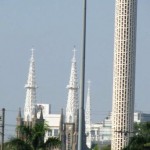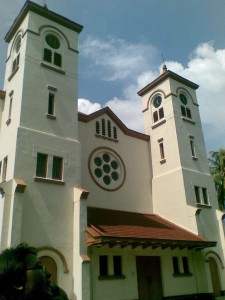Christianity first came to Indonesia in 1509 through the Portuguese. Since then, missionaries from around the world have traveled to Indonesia, established missions, and worked to spread the Gospel. Probably the most successful missionary efforts have been in Papua, where many of the people groups there are now followers of Jesus. Also, in North Sumatra missionaries saw many Batak accept Christianity in the early 20th century. Another significant movement was in the mid-1800s when a Javanese evangelist began a ministry that led thousands of Javanese Muslims to Christ. This is actually considered the first major movement of Muslims coming to Christ in the entire Muslim world.
An Increase In Churches
In the last 50 years there has been a great increase in the number of churches in Indonesia. In addition to Papua and North Sumatra, other islands in the eastern part of Indonesia have seen large numbers come to Christ. Currently, the Batak go to church and practice Christianity; however, nominalism has set into many of the churches. Expatriate workers have found, though, that when Bataks do have a relationship with Christ, they are some of the best Christian workers in Indonesia. There is also a growing number of Christians in Jakarta. Officially, 15% of the population identifies themselves as Christian. Unofficially, there are probably more Christians. Although the church is growing, many of these churches are large mega-churches in Jakarta that present Western ideas of worship that are not indigenous to Indonesia. These churches have the potential to either strengthen or hinder the church’s growth in Indonesia. In some areas, because the church is growing so rapidly, there is a huge need for discipleship and strong lay-leadership. New believers need to be discipled by other Indonesians so they do not think of Christianity as a Western religion.
Freedom of Religion?
The Indonesian government promises freedom of religion, officially giving Christians the same rights as other religious groups. However, in reality Christians go through many more obstacles than others. However, in reality Christians go through many more obstacles than others. For example, it is more difficult to register a church than it is a mosque. Also, when Muslims come to faith in Christ, they often leave Islam as the religion on their ID card because it is almost impossible to change one’s religious status. If a Muslim decides to follow Christ he most likely will face ostracism from his family. If he is from a traditional neighborhood, the neighbors may also evict him. Yet, while persecution has risen, it has also created greater unity among Christians and caused them to depend more on God.
The Unreached
There are currently 173 ethnic groups that have a Christian population of 2% or less. Sumatra is the largest unevangelized island in the world, with a large majority of these unreached people groups. Sulawesi and Java also have a large number of unreached people. Sulawesi has the largest number of unengaged, unreached people groups, meaning that no one is trying to reach the ethnic group. The need is still very great! Join us in a united prayer movement as we ask God for the salvation of every person in Indonesia.

Ask God to strengthen the Church in Indonesia and give courage to the believers. Pray for a prayer group in every neighborhood, linked with a prayer network in every city and province. Pray for Indonesian believers to be set free from tribalism, denominationalism, and local loyalties. And finally, pray for Indonesian Christians to have a burden for the thousands of unreached people surrounding them.

This is my first time pay a visit at here and i am truly impressed to read everthing at single place.
I join in praying for Indonesia Christian community, It is my prayer that one day will visit this place for evangelism.God bless all those who are praying for the Indonesians people who give their lives to Jesus.